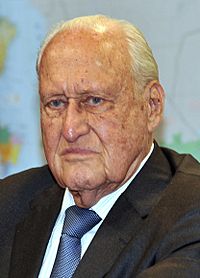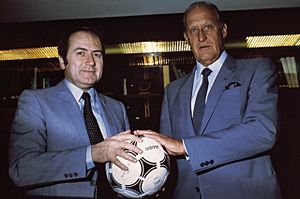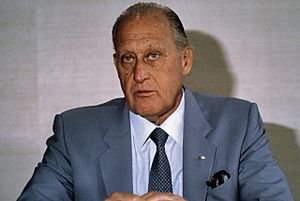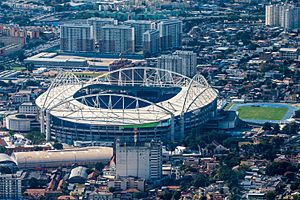João Havelange facts for kids
Quick facts for kids
João Havelange
|
|
|---|---|

Havelange in April 2010
|
|
| 7th President of FIFA | |
| In office 8 May 1974 – 8 June 1998 |
|
| Preceded by | Stanley Rous |
| Succeeded by | Sepp Blatter |
| Personal details | |
| Born |
Jean-Marie Faustin Godefroid de Havelange
8 May 1916 Rio de Janeiro, Brazil |
| Died | 16 August 2016 (aged 100) Rio de Janeiro, Brazil |
| Resting place | Cemitério São João Batista Botafogo, Município de Rio de Janeiro, Rio de Janeiro, Brazil |
| Alma mater | Fluminense Federal University |
| Occupation | Lawyer |
| Signature | |
| Medal record | ||
|---|---|---|
| Men's Water polo | ||
| Pan American Games | ||
| Silver | 1951 Buenos Aires | Team |
João Havelange (born Jean-Marie Faustin Godefroid de Havelange) was a Brazilian lawyer, businessman, and athlete. He was the seventh president of FIFA, the world's football governing body, from 1974 to 1998. His time as president was the second longest in FIFA's history.
After leaving office, he was given the title of Honorary President, but he later resigned from this role in 2013. Before becoming FIFA president, he was preceded by Stanley Rous, and after him, Sepp Blatter took over. João Havelange was also a member of the International Olympic Committee (IOC) from 1963 to 2011. He was the longest-serving active member when he resigned from the IOC.
Contents
Early Life and Sports Career
João Havelange was born on May 8, 1916, in Rio de Janeiro, Brazil. He came from a well-off family. His father, Faustin Havelange, had moved to Brazil from Belgium.
Havelange was a great student and went to the prestigious Law School of Fluminense Federal University. He graduated with a law degree when he was 24. He worked as a legal advisor for a bus company and later became the president of another bus company. He was also a senior partner at a chemical company.
From a young age, Havelange loved sports. When he was 20, he competed as a swimmer in the 1936 Summer Olympics in Berlin. He took part in the 400m freestyle and 1500m freestyle events. Later, he was part of the Brazilian water polo team that competed in the 1952 Summer Olympics in Helsinki. He also led the Brazilian team at the 1956 Summer Olympics in Melbourne.
Becoming a Sports Leader
Havelange started his journey as a sports administrator. He became the President of the Metropolitan Swimming Federation in Brazil. This led him to become a member of the Brazilian Olympic Committee. In 1958, he joined the Union Cycliste Internationale, which is the world governing body for sports cycling.
He then became the vice-president of the Brazilian Sports Confederation. From 1958 to 1973, he served as the President of this Confederation.
Leading FIFA (1974–1998)

In 1974, João Havelange ran for the presidency of FIFA. He won against Englishman Stanley Rous. This made Havelange the first person from outside Europe to lead FIFA. He traveled to 86 different countries to gain support for his election, sometimes with famous football player Pelé.
Havelange promised to make the World Cup bigger and to create a youth World Cup. These promises appealed to many developing nations. To fund his plans for FIFA, Havelange sought support from companies like Adidas and Coca-Cola. They became major sponsors of FIFA tournaments. This new way of getting money from businesses became a model for other sports organizations around the world.

Under Havelange's leadership, the money FIFA earned from selling television rights grew a lot. The FIFA World Cup expanded from 16 teams to 32 teams. Havelange oversaw six World Cups during his time in office. Also, new tournaments like the FIFA U-17 World Cup, FIFA U-20 World Cup, FIFA Confederations Cup, and FIFA Women's World Cup were started during his presidency.
Working with Others
Havelange's daughter, Lucia, was married to Brazilian football leader Ricardo Teixeira for 30 years. They later divorced. Teixeira became President of the Brazilian Football Confederation (CBF) in 1989.
In 1993, the famous Brazilian footballer Pelé made accusations against Teixeira. This led to a long disagreement between Pelé and Havelange. As a result, Havelange did not allow Pelé to attend the draw for the 1994 FIFA World Cup.
Havelange worked hard to get re-elected as FIFA President in 1994. He focused on getting votes from football groups in Africa, Asia, and North/Central America. These groups were rewarded with more spots in the World Cup, which expanded from 24 to 32 teams for the 1998 FIFA World Cup.
FIFA Presidential Elections
In 1998, Havelange announced he would step down as FIFA president after 24 years. He supported Sepp Blatter, who was then FIFA General Secretary, to become the next president. Blatter was elected as the new FIFA president.
Later Years and Health
In 2011, Havelange resigned as a member of the International Olympic Committee (IOC), citing health reasons. In April 2013, he also resigned from his role as FIFA's Honorary President due to health and personal reasons.
Havelange faced several health issues in his later years. He was hospitalized in 2012 for an ankle infection and again in 2014 for a lung infection. In 2015, he had respiratory problems.
João Havelange passed away on August 16, 2016, at the age of 100. He died in Rio de Janeiro during the 2016 Summer Olympics, which were being held in his home city.
Honors and Recognition
Havelange was elected honorary president of FIFA in 1998, a title he held until 2013. In 2006, he was named honorary Vice President of the Brazilian Ice Sports Federation for his help in developing winter sports in Brazil.
Awards
- Chevalier de la Légion d'honneur (France)
- Order of Special Merit in Sports (Brazil)
- Commander of the Cavaliers of the Order of Infante D. Henrique (Portugal)
- Grand Cross of the Order of Isabella the Catholic (Spain)
Named After Him
Several places and events were named after João Havelange to honor his important work in sports:
- The 2000 Brazilian Championship football tournament was called Copa João Havelange.
- A stadium built for the 2007 Pan American Games was named Estádio Olímpico João Havelange. This stadium hosted the athletics competitions at the 2016 Summer Olympics. It was later renamed Estádio Olímpico Nilton Santos in 2017.
- The Estádio Parque do Sabiá in Brazil also had his name previously.
- Trinidad's Dr. João Havelange Centre of Excellence was named after him.
Images for kids
See also
 In Spanish: João Havelange para niños
In Spanish: João Havelange para niños
 | Emma Amos |
 | Edward Mitchell Bannister |
 | Larry D. Alexander |
 | Ernie Barnes |


